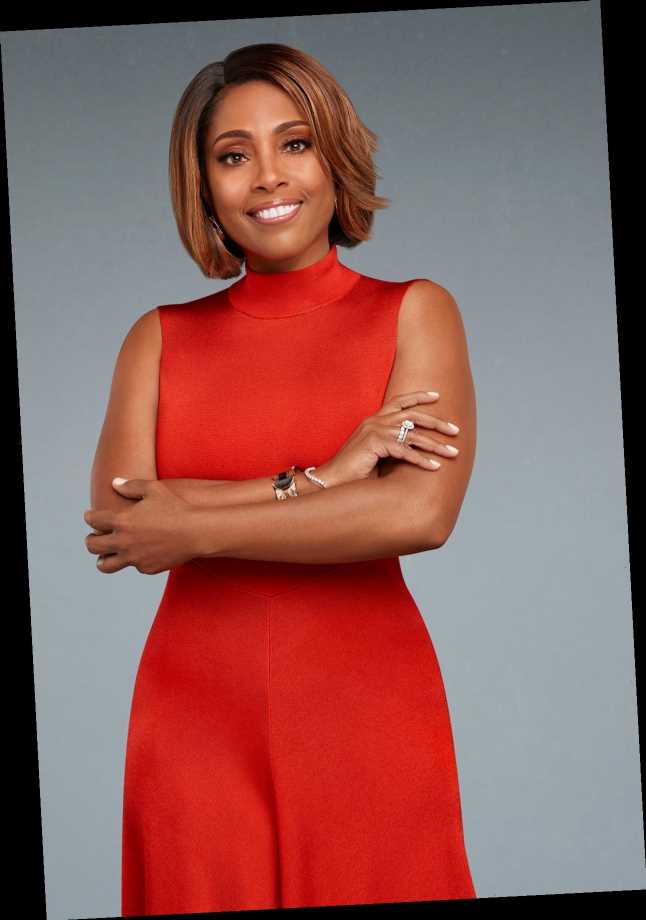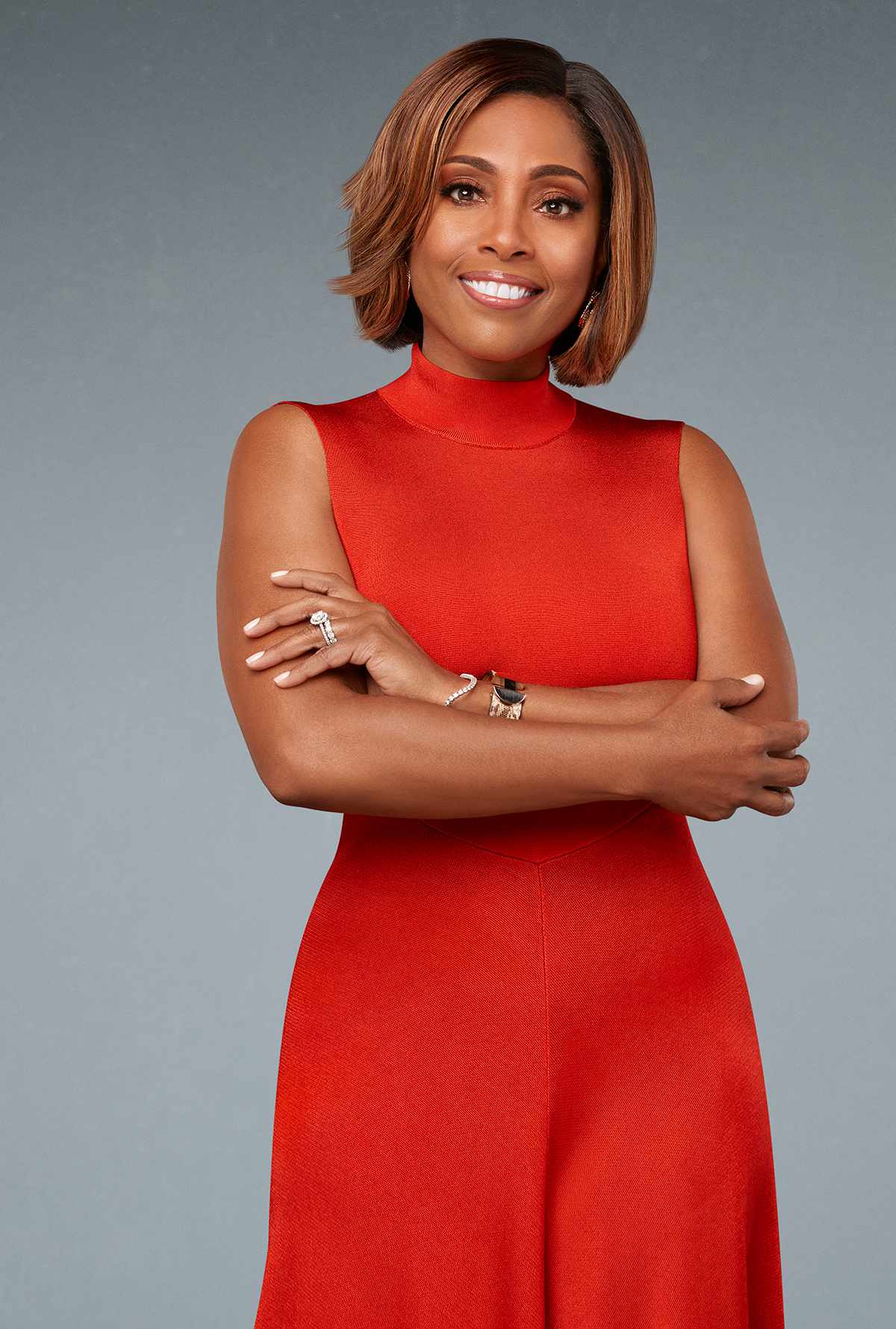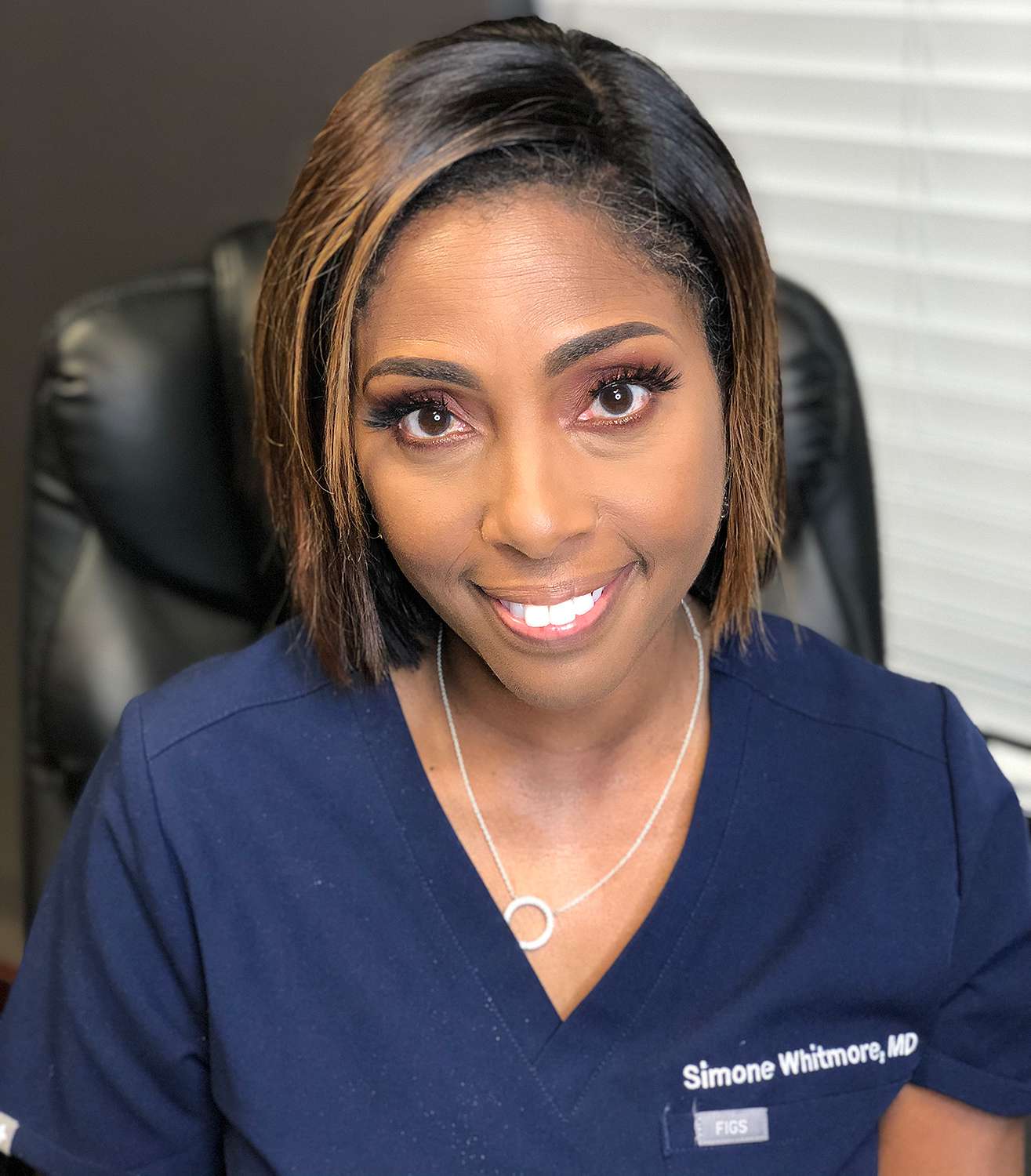Married to Medicine's Dr. Simone Whitmore, a Board Certified OB-GYN and owner of Atlanta's North Perimeter OB/GYN, spent the past year helping patients bring new life into the world amid the uncertainties of the global COVID-19 pandemic. As a gynecologist, Whitmore's priority was keeping mom and baby safe and healthy despite the challenges of a highly-contagious and deadly pathogen spreading. On top of her job-related stress, Whitmore, 49, was also looking out for her husband, Cecil, and teen sons, Miles and Michael, amid last summer's Black Lives Matter protests, and serving as a resource and educator about COVID safety precautions to her community.
When the vaccines started to roll out, as a doctor, the Bravo star was one of the first to get the shot, not only as a front line worker but as an advocate for vaccinations to help defeat the virus. With healthcare in the Black community being a "primary importance" to the Spellman College alumna, Whitmore's passion is to make sure Black people don't "get left behind" when it comes to protecting themselves and fighting the virus.
As part of PEOPLE's "Why I'm Getting Vaccinated" awareness campaign, the star opens up about why it's important to her to speak up about the importance of vaccines — and recommends visiting NBC's PlanYourVaccine.com to get all the information you need to get your shot ASAP. This is her story, as told to PEOPLE.
When the pandemic first started, it was stressful and scary — scary in the sense that we didn't know a lot about coronavirus a year ago. Once the death toll started rising and it appeared to be rising at a rapid rate, it really got real. I was thinking about, what if I get COVID just doing my everyday job I've done for the past 20 years? And it certainly was a possibility.
While doctors were figuring out ways to treat patients who became severely ill with coronavirus, we were also trying to reassure our patients every day we would keep them as safe as possible and reminding them that they had to do their part with keeping themselves safe, doing everything in their power not to be exposed to COVID. Luckily, my patients continued to stay on track with their prenatal visits; I was blessed to have a positive experience with my pregnant patients who contracted COVID.
Now, with the development of the vaccine, I was eager to get it. Being a healthcare provider, I got my first dose of Pfizer as soon as it became available to me in December and my second dose in January.
I was ecstatic about being able to get vaccinated because I am a Black woman in America, and obviously, healthcare in the Black community is of primary importance to me.
RELATED: Why I'm Getting Vaccinated: A Doctor Who Joined Clinical Trials to Improve Outcomes for People of Color
Every person I come in contact with, I can encourage them to get the vaccine. I tell them they need to get it. Black people over 40 with any comorbidities really need to get it as soon as it becomes available, but Black people are sometimes paralyzed in fear because of their perceptions pertaining to the healthcare system.
I deal with talking to family members all the time about myths in medicine and I try as much as I can to educate and encourage. My husband, Cecil, and the rest of my family have not had the vaccine yet, but as soon as he can be vaccinated, as soon as my boys can be vaccinated, we will be a vaccinated family.
I lost a cousin in Detroit, who was over 80, after she contracted COVID. It was really, really, painful to know that she was in a hospital, and her daughter and grandchildren couldn't even go to visit her — this was still during a time last summer where hospitals were overwhelmed with admissions, especially ICU admissions of positive COVID patients.
So you end up thinking: Did the nurse even have time to hold her hand or rub on her arm? As a doctor, I'm getting all this second-hand information from her daughter and grandchildren. At one point, they thought she was getting weaned off of the ventilator but she ended up not coming off the ventilator and passing away.
My mom, who is in her mid 70s, is in the category where she could get her vaccine, but she is not making it a top priority yet. She agrees she should have it, but she lives alone, and she doesn't really go out in the population, so I'm sure in some regards, she's thinking she doesn't need it. At some point, [though], we want to be able to travel, be able to go out with the general population and get this country back to normal again.
RELATED: 'Why I'm Getting Vaccinated:' The Police Chief Who Wants to 'Reassure Skeptics' — and Keep His Force Healthy
My younger son, Michael, is the most social human being in my house. I was definitely nervous about Michael leaving for college in the midst of the pandemic because he wants to hang out with his friends, and I knew that once he left home, it would be completely out of my control regarding what activities he did and participated in. We just loaded him up with masks and got a company that would continue to ship masks to him on a monthly basis.
All we could do is talk to him, encourage him to wear his masks; "don't try to go to parties off campus," that sort of a thing. I was also equally worried about his safety, going to school in a small town in Tennessee. I just remember driving up to the campus and seeing various homes with Confederate flags hanging outside.
My husband and I have always been conscientious of how Black males are treated in America … I was concerned to the point of just telling Michael, you really are going to have to be careful when you leave the campus, and you're going to restaurants or going to the grocery store or doing whatever. Along with the pandemic, I told him, 'You need to stay out of trouble and avoid coming in contact with police.' It was like a double concern.
Now, with the vaccine rollout underway, I am encouraging everyone I know, especially African-Americans, to get vaccinated because again, we're dying at a disproportionate rate compared to other ethnic groups in the country. We're getting COVID and dying from COVID. And if there is something available to help us, we have to get it.
We can't be the group that's left behind — and left behind by choice. Now we actually have a choice, and the choice is to get the vaccine and not to be left behind.
Before being released to the public, vaccine-makers went through large, lengthy clinical trials to ensure that their product is completely safe. On Sept. 8, nine of the leading vaccine makers — including Pfizer and Moderna — signed a pledge vowing to follow "high ethical standards" and not rush a vaccine into production before it is proven to work.
As information about the coronavirus pandemic rapidly changes, PEOPLE is committed to providing the most recent data in our coverage. Some of the information in this story may have changed after publication. For the latest on COVID-19, readers are encouraged to use online resources from the CDC, WHO and local public health departments. PEOPLE has partnered with GoFundMe to raise money for the COVID-19 Relief Fund, a GoFundMe.org fundraiser to support everything from frontline responders to families in need, as well as organizations helping communities. For more information or to donate, click here.
Source: Read Full Article


